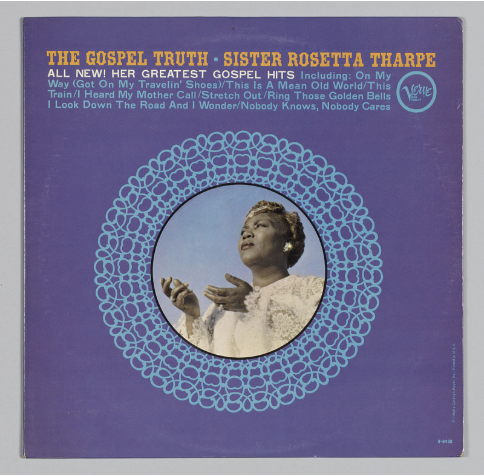
Celebrating the Music of SHOUT SISTER SHOUT!
Listen to our teaser playlist and learn about Sister Rosetta Tharpe’s impact on music.
As SHOUT SISTER SHOUT! continues to uplift audiences, we wanted to share some seminal Sister Rosetta Tharpe songs that appear in this rousing musical. We explore the history and impact that her music has made on the worlds of rock-and-roll, R&B and gospel. Listen to our teaser playlist below:
“Shout, Sister, Shout!”
The titular song of the musical and the book is described in author Gayle F. Wald’s book Shout, Sister, Shout: The Untold Story of Rock-and-Roll Trailblazer Sister Rosetta Tharpe as a “light, upbeat call-and-response song in which the band members played the ragged chorus to Rosetta’s ‘Sister’ persona.” The song was popular during Rosetta’s Cotton Club era, right before and during World War II.
“Shout, Sister, Shout” is also the title of the 2002 album that pays homage to Rosetta’s legacy through new versions of her songs, primarily by women musicians. Notably, Marie Knight recorded a solo cover of “Didn’t It Rain” on that album.
“Can’t Sit Down”
This song was released along with “The End of the Journey” in 1941 for her series of Decca releases, and would later appear in her larger collection of her early discography, Sister Rosetta Tharpe Vol. 1 (1938-1941). In SHOUT SISTER SHOUT!, “Sit Down” is portrayed as her first big solo at the legendary Cotton Club, featuring her iconic duck walk.

“On My Way”
A song that showcases Rosetta’s desire to be the trailblazer that she was, “On My Way” is imagined in our production at a turning point where she resolves to carve out her own path and not let anyone get in her way. Her original recording of “On My Way” (subtitle: “Got On My Travelin’ Shoes”) was the opening track of her album “The Gospel Truth,” released in 1959.
According to Martin Williams in Verve Records’ original description of the album, on display at the Smithsonian Museum of African American History and Culture:
“The introduction will convince you that Rosetta can make her guitar talk and sing with the same cutting edge that her voice has – indeed, when I first heard those introductory notes on that piece, I had the feeling she could make her instrument carry and be heard in the middle of a riot.”
The song also features antiphonal phrases and call and response: a standard of jazz, gospel and spiritual music that encourages engagement and audience interaction. As the leader of the song and a member of the congregation, Rosetta truly takes you to church.
“Down By the Riverside”
This song was previously mentioned on the Ford’s Blog as a major song in her development as a musical artist. “Down By the Riverside” dates to the 19th century as a slave spiritual. It was recorded dozens of times in the 20th century by religious as well as secular artists. In an essay for the Library of Congress, our very own Gayle F. Wald said:
“No treatment of the song is as revealing of cultural trends in the commercialization and popularization of ‘sacred’ music as the jaunty version recorded in 1944 by the Lucky Millinder Orchestra featuring ‘Sister’ Rosetta Tharpe.”
Rosetta’s rendition is special for several reasons: her hybrid of gospel and pop; her rapid-fire picking technique, rhythmic attack and bluesy note-bending; and its own context, recorded as “hopeful and future-facing” as the U.S. became involved in World War II.
Learn more about SHOUT SISTER SHOUT! at Ford’s Theatre and get tickets here. When you visit, explore our lobby for more fun facts about Sister Rosetta Tharpe.

